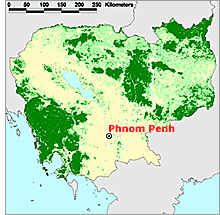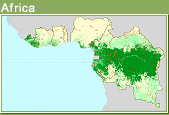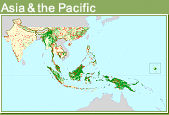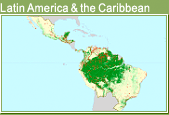Country details
Status of Tropical Forest Management 2005
Asia & the Pacific
Cambodia

©UNEP-WCMC 2004
Deforestation is expanding rapidly in Cambodia. Nevertheless, the country has a large forest resource with the potential to sustain a robust timber industry and contribute enormously to national development. But the recent history of Cambodian forestry has been turbulent, and the timber sector is in disarray. The concession system has been suspended, yet unauthorized timber production apparently continues. The implementation of recent reforms, and increased law enforcement, are urgently required.
Key points
- Cambodia's significant reserves of high-value production forests present an important economic resource, the sustainable use of which would be of considerable benefit to the country.
- Cambodia has an estimated 8.10 million hectares of PFE, comprising 3.46 million hectares of natural production forest, 4.62 million hectares of protection forest and 17,000 hectares of industrial timber plantations. However, data on Cambodian forests are often inconsistent and unreliable.
- No part of the production PFE is considered to be under sustainable management; insufficient information was available to estimate the area of protection PFE so managed.
- A significant but unestimated area of forest has been degraded by shifting cultivation, encroachment, the development of agro-industries, illegal logging, over-harvesting and forest fire, as well as by the use of chemicals during war.
- The Forestry Administration was created in 2003, replacing the Department of Forestry and Wildlife; it has responsibility for managing the forest estate, although there may be some overlap in roles with the Ministry of Environment for forests in national parks and related reserves.
- Forest-sector reforms have been developed but are yet to be implemented effectively; the enforcement of existing policies, laws and regulations is weak.
- The management of forest concessions has been poor; the government cancelled some licences and, in 2002, suspended all remaining forest concessions until they fully complied with requirements. One apparent effect of this ban has been to stimulate a significant illegal timber industry.

 Africa
Africa  Asia & the Pacific
Asia & the Pacific  Latin America & the Caribbean
Latin America & the Caribbean